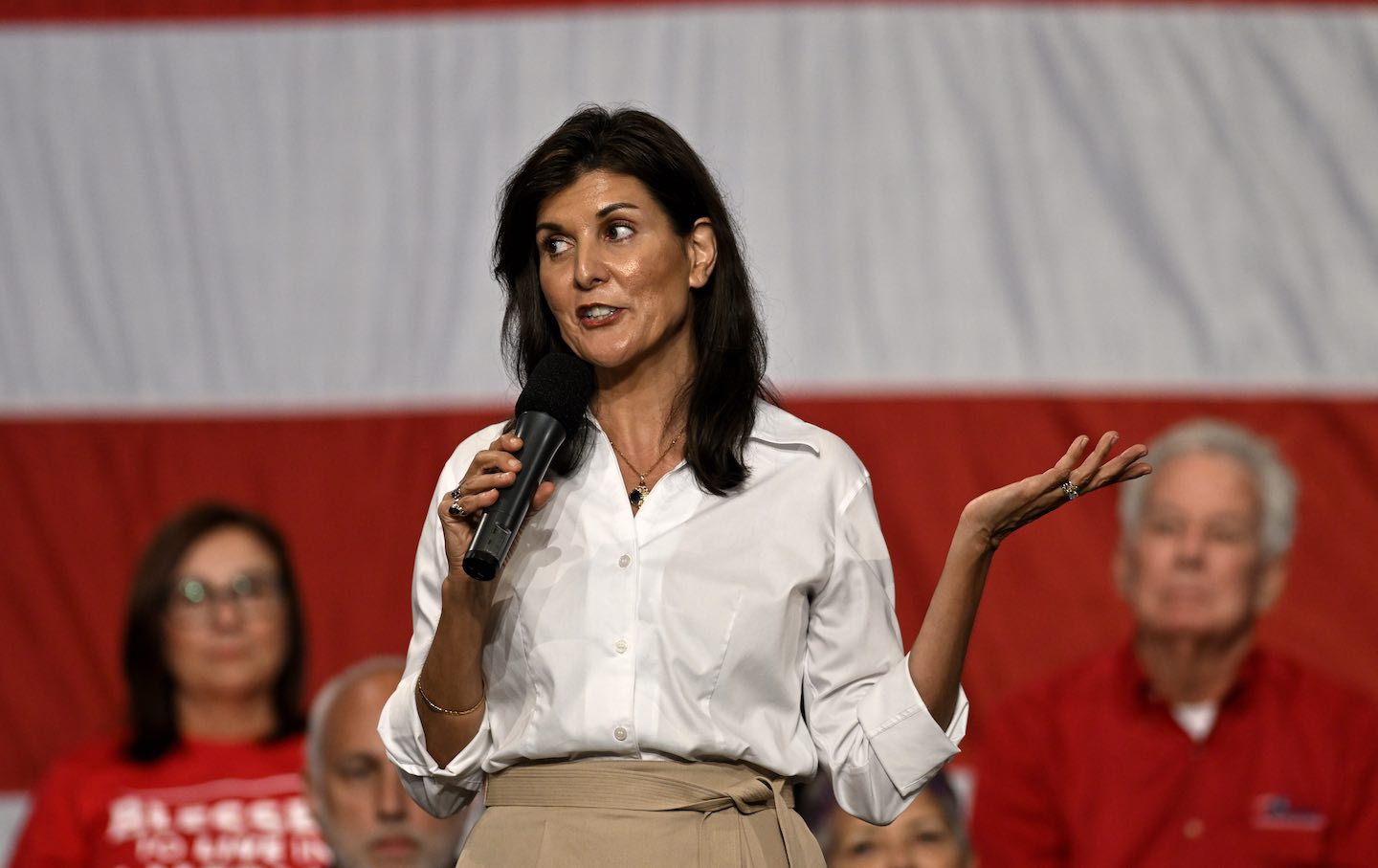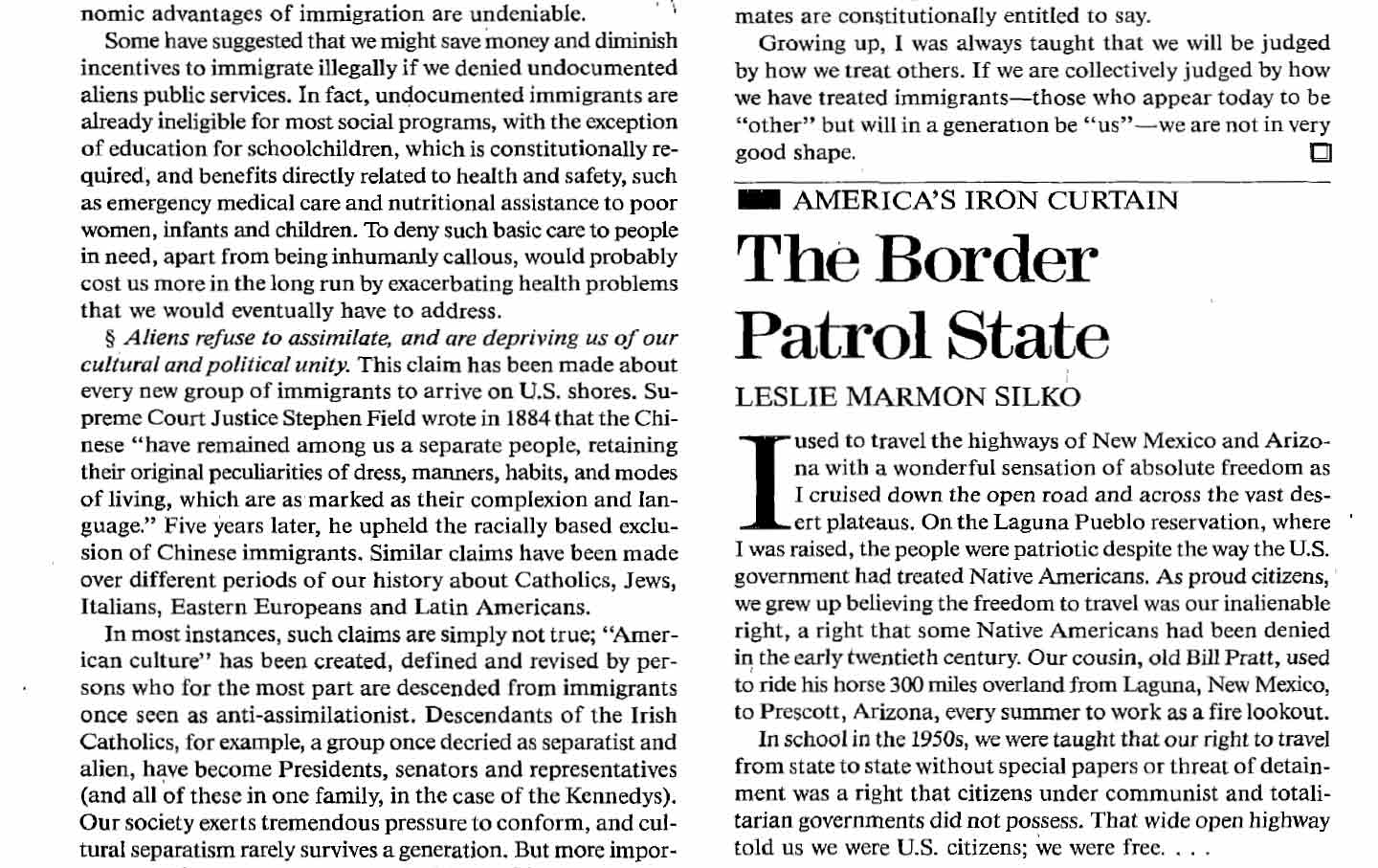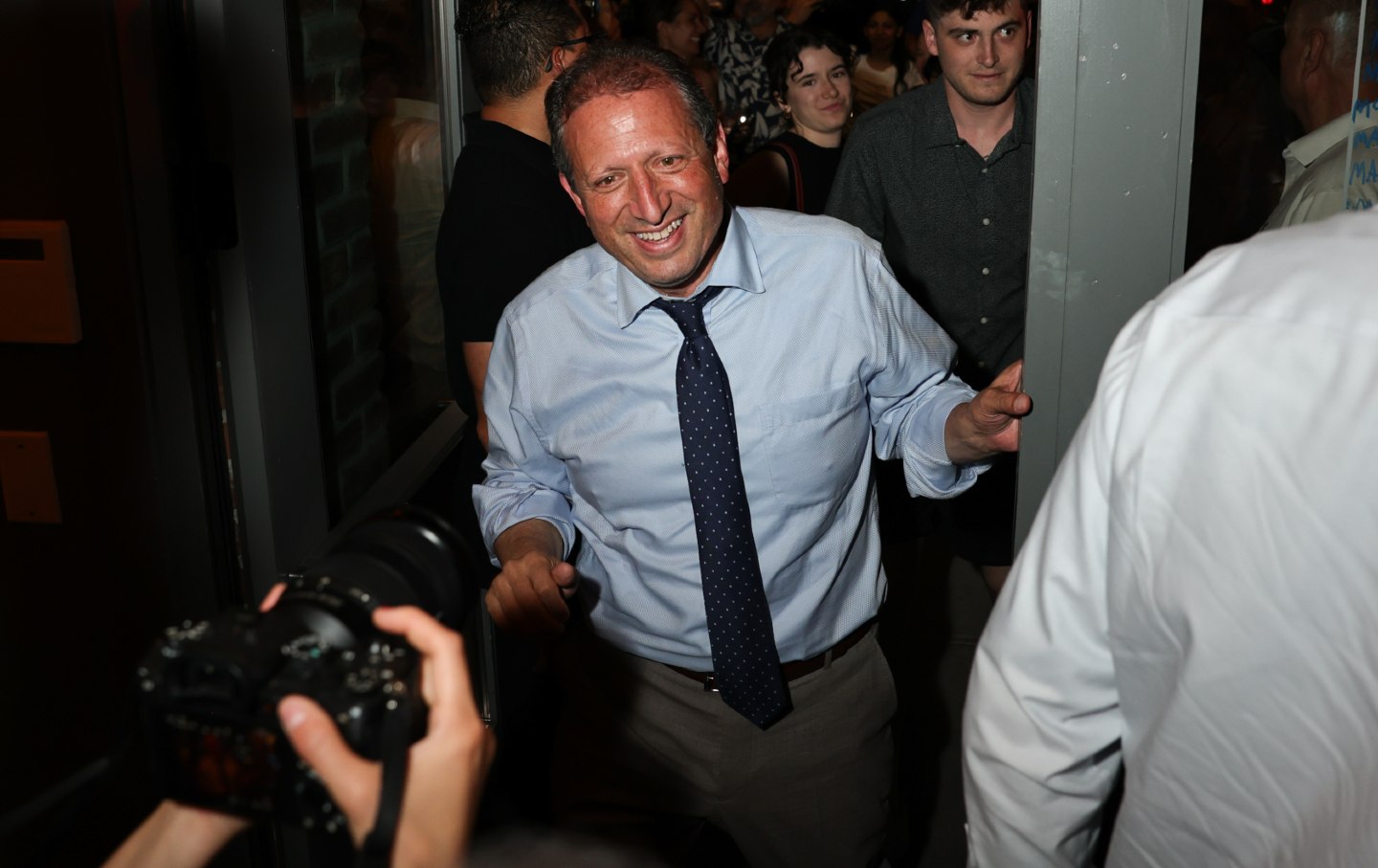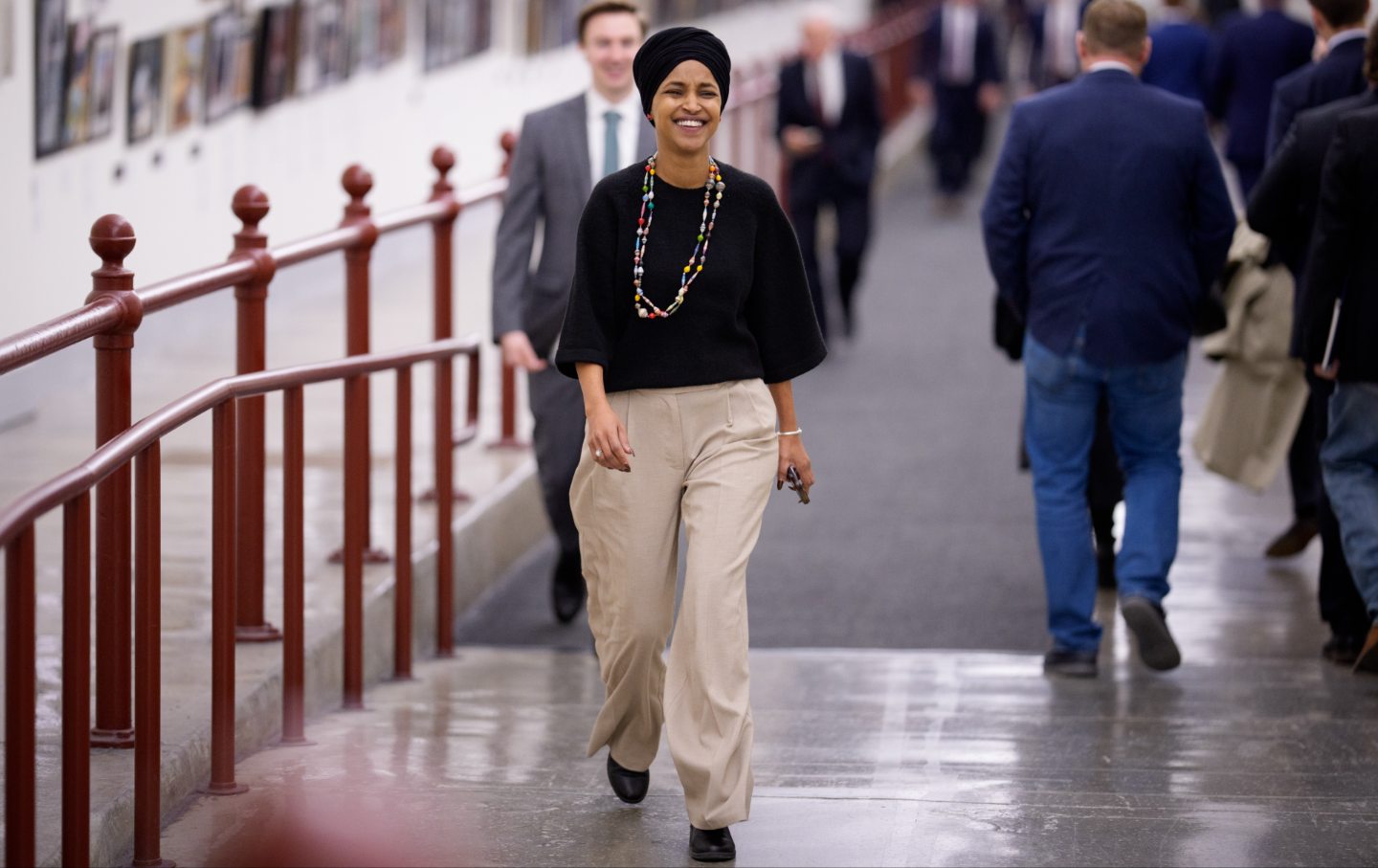The UAW Strike Inspires Anti-Union Panic—and Lies—From GOP Presidential Contenders
Tim Scott calls for firing workers. Nikki Haley celebrates union busting. And Trump’s attacking UAW leaders.

Republican presidential candidate Nikki Haley
(Photo by Peter Zay / Anadolu Agency via Getty Images)When Dwight Eisenhower was running for president in 1952, he addressed the national convention of the American Federation of Labor, delivering a full-throated embrace of industrial unions. “Today in America unions have a secure place in our industrial life,” Eisenhower told the AFL delegates. “Only a handful of unreconstructed reactionaries harbor the ugly thought of breaking unions. Only a fool would try to deprive working men and women of the right to join the union of their choice.”
Well, Ike, meet the Republicans who are running for your party’s 2024 presidential nomination. Since United Auto Workers union members began their strike against the Big Three automakers, GOP candidates have confirmed that the party of Eisenhower is now the party of unreconstructed reactionaries.
Senator Tim Scott (R-S.C.) has gone so far as to propose firing strikers. Recalling former President Ronald Reagan’s controversial decision to dismiss striking members of the Professional Air Traffic Controllers Organization in 1981, Scott said during a campaign event in Iowa, “I think Ronald Reagan gave us a great example when federal employees decided they were going to strike. He said, ‘You strike, you’re fired.’ Simple concept to me, to the extent that we can use that once again.”
The anti-union senator’s proposal to extend Reagan’s assault on public-sector workers to the private sector drew a stiff rebuke from the UAW. Its president, Shawn Fain, ripped the South Carolina Republican’s remarks: “Just another example of how the employer class abuses the working class in America. Employers willfully violate labor law with little to no repercussions.” Fain then filed a complaint against Scott with the National Labor Relations Board on Thursday, and declared, “Time for more stringent laws to protect workers’ rights!!”
But Scott was hardly an outlier among top GOP contenders.
Former United Nations ambassador Nikki Haley, who reveled in her reputation as “a union buster” when she served as the governor of South Carolina—the state that historically has had the lowest level of union membership in the country—denounced both the UAW strike and President Joe Biden, who has come out in support of the workers, even announcing plans to join a picket line in Michigan.
“When you have the most pro-union president and he touts that he is emboldening the unions, this is what you get,” Haley griped shortly after the strike began. “The union is asking for a 40 percent raise; the companies have come back with a 20 percent raise. I think any of the taxpayers would love to have a 20 percent raise and think that’s great.”
What she neglected to mention, however, is the fact that the UAW asked for the 40 percent wage boost, over a number of years, to make union members whole after they sacrificed earnings, cost-of-living increases, and benefits to keep the auto companies afloat during the Great Recession. According to the Economic Policy Institute, “auto manufacturing workers have seen their average real hourly earnings fall 19.3 percent since 2008.”
And, of course, Haley failed to acknowledge that the union’s proposal for a 40 percent pay increase simply paralleled the increase in pay for CEOs in an industry that has made $250 billion in profits over the past decade.
As ugly as the anti-worker rhetoric from Scott and Haley has been, there’s a good case to be made that the most crudely anti-union sentiments have been expressed by former president Donald Trump, who for years has sought to fool industrial workers into accepting him as their ally. Since the strike, Trump’s rhetoric has been even more anti-union than that of the CEOs of GM, Ford, and Stellantis.
In a September 17 appearance on NBC’s Meet the Press, Trump was asked by moderator Kristen Welker to explain which side he was on in the strike. Instead of saying he was with the workers and their union, the former president skirted the question, saying he was “on the side of making our country great.” Then he launched into his shopworn critique of electric vehicles.
As part of his diatribe, Trump ripped into UAW leaders and members for their focus on preserving jobs and improving pay and conditions as the industry transitions to electric-vehicle production.
Popular
“swipe left below to view more authors”Swipe →“The auto workers are being sold down the river by their leadership,” claimed Trump, who alleged that UAW president Fain is “not doing a good job in representing his union, because he’s not going to have a union in three years from now. Those jobs are all going to be gone, because all of those electric cars are going to be made in China.”
Trump’s playing one of the oldest cards in the corporate deck—seeking to drive a wedge between workers and their union. He’ll up the ante on Wednesday, when he plans to fly to Detroit to address a small group of workers. But the union is having none of it. Though the UAW has not made an endorsement in the presidential race, Fain ripped into Trump.
“Every fiber of our union is being poured into fighting the billionaire class and an economy that enriches people like Donald Trump at the expense of workers,” said the UAW president. “We can’t keep electing billionaires and millionaires that don’t have any understanding what it is like to live paycheck to paycheck and struggle to get by and expecting them to solve the problems of the working class.”
Trump would have done better to study up on the perspective of Eisenhower, who referred to right-wingers who attacked labor laws as “stupid” and said, “I have no use for those—regardless of their political party—who hold some foolish dream of spinning the clock back to days when unorganized labor was a huddled, almost helpless mass.”
There is nothing huddled or helpless about the UAW. It’s fighting for workers’ rights. And no matter what these Republican presidential contenders say, polling shows that 75 percent of the American people are on the union’s side.
Disobey authoritarians, support The Nation
Over the past year you’ve read Nation writers like Elie Mystal, Kaveh Akbar, John Nichols, Joan Walsh, Bryce Covert, Dave Zirin, Jeet Heer, Michael T. Klare, Katha Pollitt, Amy Littlefield, Gregg Gonsalves, and Sasha Abramsky take on the Trump family’s corruption, set the record straight about Robert F. Kennedy Jr.’s catastrophic Make America Healthy Again movement, survey the fallout and human cost of the DOGE wrecking ball, anticipate the Supreme Court’s dangerous antidemocratic rulings, and amplify successful tactics of resistance on the streets and in Congress.
We publish these stories because when members of our communities are being abducted, household debt is climbing, and AI data centers are causing water and electricity shortages, we have a duty as journalists to do all we can to inform the public.
In 2026, our aim is to do more than ever before—but we need your support to make that happen.
Through December 31, a generous donor will match all donations up to $75,000. That means that your contribution will be doubled, dollar for dollar. If we hit the full match, we’ll be starting 2026 with $150,000 to invest in the stories that impact real people’s lives—the kinds of stories that billionaire-owned, corporate-backed outlets aren’t covering.
With your support, our team will publish major stories that the president and his allies won’t want you to read. We’ll cover the emerging military-tech industrial complex and matters of war, peace, and surveillance, as well as the affordability crisis, hunger, housing, healthcare, the environment, attacks on reproductive rights, and much more. At the same time, we’ll imagine alternatives to Trumpian rule and uplift efforts to create a better world, here and now.
While your gift has twice the impact, I’m asking you to support The Nation with a donation today. You’ll empower the journalists, editors, and fact-checkers best equipped to hold this authoritarian administration to account.
I hope you won’t miss this moment—donate to The Nation today.
Onward,
Katrina vanden Heuvel
Editor and publisher, The Nation
More from The Nation

Why Epstein’s Links to the CIA Are So Important Why Epstein’s Links to the CIA Are So Important
We won’t know the full truth about his crimes until the extent of his ties to US intelligence are clear.

How the Border Patrol Moved Inland—and Created a Police State How the Border Patrol Moved Inland—and Created a Police State
In 1994, the writer Leslie Marmon Silko wrote a piece for The Nation warning of a frightening new immigration regime.

Rob Reiner, Bari Weiss, and the Shifting Politics of Hollywood Rob Reiner, Bari Weiss, and the Shifting Politics of Hollywood
Weiss’s ascent reveals the extent to which Hollywood, once a Democratic stronghold, has defected for a politics that puts the concerns and egos of wealthy people first.

Brad Lander on What It Takes to Win as a Progressive Brad Lander on What It Takes to Win as a Progressive
The outgoing New York City comptroller discusses governing on the left, his run for Congress, and why housing and affordability should define the next Democratic fight.

The Public Health Heroes of 2025 The Public Health Heroes of 2025
The Trump administration wants to destroy our health infrastructure. These warriors aren't letting that happen without a fight.

Why Ilhan Omar Makes the Right Lose Its Mind Why Ilhan Omar Makes the Right Lose Its Mind
Trump and his MAGA allies want people like Omar to vanish from this country—and they hate her for refusing to do so.


